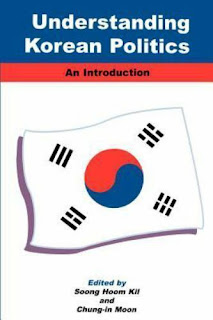I think it is probably worth studying why Korea has remained so quiet in the west, considering that it's history is quite wild. Not only did it have a miraculous economic growth, it did so through three dictatorships and some serious political craziness (including the president being assassinated by the head of the Korean CIA in 1987!). Why does Korea get so little play in the west? This book did not go into that, but it was a solid and sometimes interesting overview of Korea's political history, coming out of WWII being basically occupied by the US and USSR, getting split after the Korean War and then developing from a US-dependent military dictatorship to an independent, democratic economic powerhouse.
Though a bit dry and basically undergrad poli-sci with some of the nonsense that brings (academics still struggle with arguing over which theoretical lens is best and then concluding oh yeah we can use many), this book was divided into digestible chapters, all of which were really well-researched and directly presented. What I found particularly interesting is how the dictatorships had such control until, in each case, they went too far and popular protest ended up bringing them down. I'm over-simplifying but there seems to be something in 20th century Korean history where the people are unified enough (and having the threat of North Korea is a major factor here) that they can exist with a dictatorship and yet also bring it down. It bums me out that in their last election, they chose a populist asshole (though barely, but isn't that how these fucks get in power everywhere?). I hope Korean cultural and political unity can withstand the dividing power of today's internet.





No comments:
Post a Comment